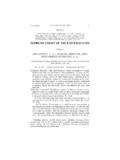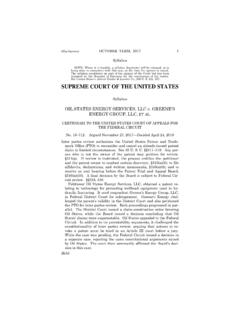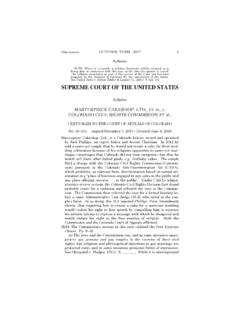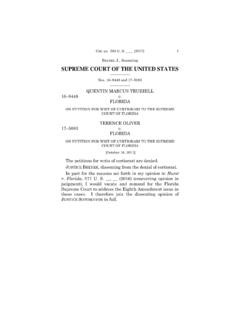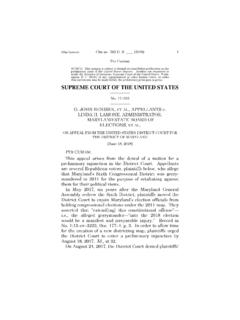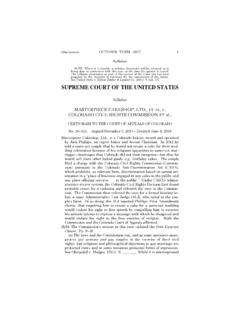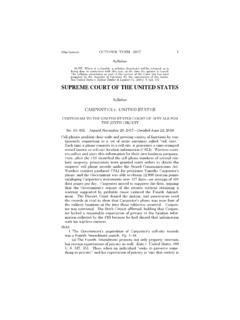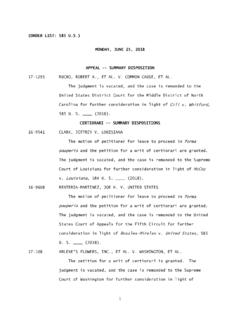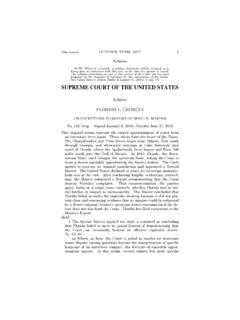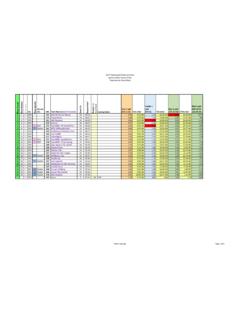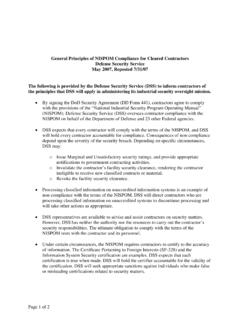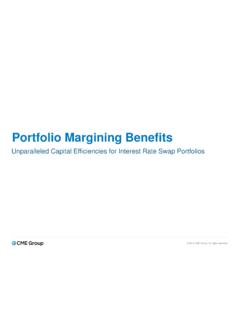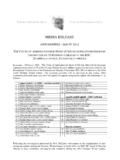Transcription of SUPREME COURT OF THE UNITED STATES
1 1 (Slip Opinion) OCTOBER TERM, 2009 Syllabus NOTE: Where it is feasible, a syllabus (headnote) will be released, as isbeing done in connection with this case, at the time the opinion is syllabus constitutes no part of the opinion of the COURT but has beenprepared by the Reporter of Decisions for the convenience of the reader. See UNITED STATES v. Detroit Timber & Lumber Co., 200 U. S. 321, 337. SUPREME COURT OF THE UNITED STATES Syllabus citizens UNITED v. FEDERAL ELECTION COMMISSION APPEAL FROM THE UNITED STATES DISTRICT COURT FOR THE DISTRICT OF COLUMBIA No. 08 205. Argued March 24, 2009 Reargued September 9, 2009 Decided January 21, 2010 As amended by 203 of the Bipartisan Campaign Reform Act of 2002(BCRA), federal law prohibits corporations and unions from usingtheir general treasury funds to make independent expenditures for speech that is an electioneering communication or for speech thatexpressly advocates the election or defeat of a candidate.
2 2 U. S. C. 441b. An electioneering communication is any broadcast, cable, orsatellite communication that refers to a clearly identified candidatefor Federal office and is made within 30 days of a primary election, 434(f)(3)(A), and that is publicly distributed, 11 CFR (a)(2),which in the case of a candidate for nomination for President .. means that the communication [c]an be received by 50,000 or morepersons in a State where a primary election .. is being held within 30 days, (b)(3)(ii). Corporations and unions may establish apolitical action committee (PAC) for express advocacy or electioneer-ing communications purposes. 2 U. S. C. 441b(b)(2). In McConnell v. Federal Election Comm n, 540 U. S. 93, 203 209, this COURT upheld limits on electioneering communications in a facial challenge, relyingon the holding in Austin v.
3 Michigan Chamber of Commerce, 494 U. S. 652, that political speech may be banned based on the speaker s corporate January 2008, appellant citizens UNITED , a nonprofit corpora-tion, released a documentary (hereinafter Hillary) critical of then-Senator Hillary Clinton, a candidate for her party s Presidential nomination. Anticipating that it would make Hillary available on cable television through video-on-demand within 30 days of primaryelections, citizens UNITED produced television ads to run on broadcast 2 citizens UNITED v. FEDERAL ELECTION COMM N Syllabus and cable television. Concerned about possible civil and criminal penalties for violating 441b, it sought declaratory and injunctive re-lief, arguing that (1) 441b is unconstitutional as applied to Hillary;and (2) BCRA s disclaimer, disclosure, and reporting requirements,BCRA 201 and 311, were unconstitutional as applied to Hillaryand the ads.
4 The District COURT denied citizens UNITED a prelimi-nary injunction and granted appellee Federal Election Commission(FEC) summary judgment. Held: 1. Because the question whether 441b applies to Hillary cannot be resolved on other, narrower grounds without chilling political speech, this COURT must consider the continuing effect of the speech suppres-sion upheld in Austin. Pp. 5 20.(a) Citizen UNITED s narrower arguments that Hillary is not an electioneering communication covered by 441b because it is not publicly distributed under 11 CFR (a)(2); that 441b maynot be applied to Hillary under Federal Election Comm n v. Wisconsin Right to Life, Inc., 551 U. S. 449 (WRTL), which found 441b uncon-stitutional as applied to speech that was not express advocacy or its functional equivalent, id.
5 , at 481 (opinion of ROBERTS, C. J.), deter-mining that a communication is the functional equivalent of express advocacy only if [it] is susceptible of no reasonable interpretationother than as an appeal to vote for or against a specific candidate, id., at 469 470; that 441b should be invalidated as applied to movies shown through video-on-demand because this delivery system has alower risk of distorting the political process than do television ads;and that there should be an exception to 441b s ban for nonprofitcorporate political speech funded overwhelming by individuals arenot sustainable under a fair reading of the statute. Pp. 5 12.(b) Thus, this case cannot be resolved on a narrower ground without chilling political speech, speech that is central to the First Amendment s meaning and purpose.
6 citizens UNITED did not waive this challenge to Austin when it stipulated to dismissing the facial challenge below, since (1) even if such a challenge could be waived, this COURT may reconsider Austin and 441b s facial validity here be-cause the District COURT passed upon the issue, Lebron v. National Railroad Passenger Corporation, 513 U. S. 374, 379; (2) throughoutthe litigation, citizens UNITED has asserted a claim that the FEC hasviolated its right to free speech; and (3) the parties cannot enter intoa stipulation that prevents the COURT from considering remedies nec-essary to resolve a claim that has been preserved. Because Citizen UNITED s narrower arguments are not sustainable, this COURT must, in an exercise of its judicial responsibility, consider 441b s facial valid-ity.
7 Any other course would prolong the substantial, nationwide 3 Cite as: 558 U. S. ____ (2010) Syllabus chilling effect caused by 441b s corporate expenditure ban. This conclusion is further supported by the following: (1) the uncertaintycaused by the Government s litigating position; (2) substantial timewould be required to clarify 441b s application on the points raisedby the Government s position in order to avoid any chilling effect caused by an improper interpretation; and (3) because speech itself is of primary importance to the integrity of the election process, anyspeech arguably within the reach of rules created for regulating po-litical speech is chilled. The regulatory scheme at issue may not be aprior restraint in the strict sense.
8 However, given its complexity and the deference courts show to administrative determinations, a speaker wishing to avoid criminal liability threats and the heavycosts of defending against FEC enforcement must ask a governmen-tal agency for prior permission to speak. The restrictions thus func-tion as the equivalent of a prior restraint, giving the FEC poweranalogous to the type of government practices that the First Amend-ment was drawn to prohibit. The ongoing chill on speech makes itnecessary to invoke the earlier precedents that a statute that chills speech can and must be invalidated where its facial invalidity hasbeen demonstrated. Pp. 12 20. 2. Austin is overruled, and thus provides no basis for allowing the Government to limit corporate independent expenditures.
9 Hence, 441b s restrictions on such expenditures are invalid and cannot be applied to Hillary. Given this conclusion, the part of McConnell that upheld BCRA 203 s extension of 441b s restrictions on independent corporate expenditures is also overruled. Pp. 20 51. (a) Although the First Amendment provides that Congress shallmake no law .. abridging the freedom of speech, 441b s prohibitionon corporate independent expenditures is an outright ban on speech, backed by criminal sanctions. It is a ban notwithstanding the factthat a PAC created by a corporation can still speak, for a PAC is aseparate association from the corporation. Because speech is an es-sential mechanism of democracy it is the means to hold officials ac-countable to the people political speech must prevail against lawsthat would suppress it by design or inadvertence.
10 Laws burdening such speech are subject to strict scrutiny, which requires the Gov-ernment to prove that the restriction furthers a compelling interest and is narrowly tailored to achieve that interest. WRTL, 551 U. S., at 464. This language provides a sufficient framework for protecting the interests in this case. Premised on mistrust of governmentalpower, the First Amendment stands against attempts to disfavor cer-tain subjects or viewpoints or to distinguish among different speak-ers, which may be a means to control content. The Government may also commit a constitutional wrong when by law it identifies certain 4 citizens UNITED v. FEDERAL ELECTION COMM N Syllabus preferred speakers. There is no basis for the proposition that, in thepolitical speech context, the Government may impose restrictions oncertain disfavored speakers.
